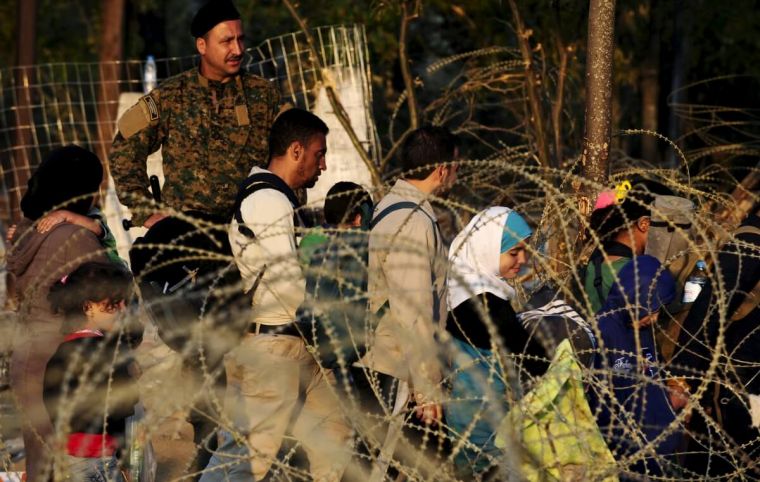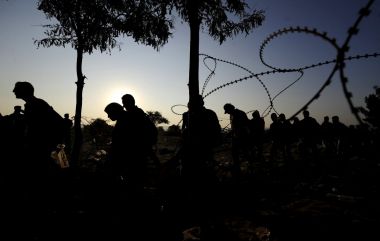Migrant crisis: What does the future hold for central Europe?

Every summer as a child my parents would throw myself and my two brothers into the back of the car and drive across Europe to visit our family in Austria. The trek would take two or three days, crossing over the North Sea by ferry (later the English Channel by Hovercraft) and then driving to relatives in Germany for a night or two's rest. After that we jumped into the car again and eventually arrived in the middle of the Styrian Alps in the town where my grandparents had lived and ministered – my grandfather was a Lutheran pastor – since the late 1930s. These were the days of passport checks on every border, American Forces Network on the medium wave as we passed the convoys of US tanks winding their way through Bavaria, and a different currency for each country.
Fast forward to this summer and while the car trip has been replaced by flights and a hire car, there are still children tightly belted in the rear, but they just happen to be my children rather than myself. The destination is still roughly the same. The food is the same (actually, the food is better because as an adult you graduate from Wiener Schnitzel and Frankfurters to the finest of Austrian fayre) and the people are still pretty much the same – outside of the big cities, Austria is still a very parochial society. But the one thing that is different is the news.
This summer the news in Austria has been all about migrants, and not the kind that Austrians enjoy like myself and my family. Migrate to Austria with a bulging credit card limit, Euros in the pocket and a good Austrian accent, and the country couldn't be happier. But we were not the only migrants in the Alps this summer, and some are causing problems. Big problems.
This summer, Austria is coping with nearly 100,000 refugees not just passing through its borders but actually putting their bags down (if they have any) and looking for a place to rest their head. To put that into a British perspective, it's the equivalent of a million people turning up in the UK and needing food, housing and their life put into some semblance of order. Forget a few thousand rattling the gates at Calais, this is a human influx on an utterly different scale and it's being repeated across Europe country by country as families flee the ravages of war-torn Syria and Iraq, the dictatorial conscription in Eritrea and the anarchy that is large parts of Libya. Throw into that those leaving economic misery in Asia and Africa for the golden streets of the EU and the total picture is of well over a million people entering Europe just this year seeking shelter and peace (some estimates put the figure at up to 3 million). It is the biggest migration crisis facing Europe since the end of the Second World War and it is starting to have deep political repercussions.
When we flew into the Austria in the middle of August, the news was full of this story from all across Europe. Forget the insularity of the British press focussing on a single Channel port, on Austrian TV we saw the tensions on the Greek-Macedonian border days before the BBC reported it. We were shown pictures of families sleeping rough in Serbian parks and town centres, desperate to get their children into the EU. We saw shots of school halls filled with migrants, and local officials scratching their heads as to what to do with all these people when the new academic term started in just a few weeks. Britain was complaining about a few hundred people scaling fences while down in Macedonia, tens of thousands were being held back on the border with tear gas and the threat of semi-automatic weapons.

As much as the governments of central Europe were trying to be welcoming and friendly, while we were in Austria the borders went back up in Macedonia, Serbia, Hungary and Bulgaria, and even in the heart of Schengenland the Austrian and Bavarian administrations discussed increased border controls in the middle of Europe. I thought I had seen the end of barbed wire borders as a child. I still remember driving along the Austrian-Czech border in the late '80s with the three metre high fences and watchtowers every hundred metres or so. That summer, well before the fall of the Iron Curtain, we visited the border town of Hardegg and saw the bridge that had famously had the whole Czech side taken away to leave just a frame of girders in an attempt to stop anyone leaving the country via that route. This was the same year that in exploring the border further along its length, we drove through the woods and suddenly realised that it was very likely we had passed over into Czechoslovakia. Like 21st century migrants, we discovered that the assumed secure borders were actually highly porous, though I expect both groups of travellers separated by a generation were equally scared at the possibilities of what had just happened. We beat a hasty retreat back in Austria. The refugees from outside of Europe press on in hope of a new home and a new start.
Different countries, different histories, different experiences. For Britain, the story of migration over the last few hundred years has been broadly one of open welcome. From the Hugenots fleeing the events of St Bartholomew's Day, to the 20th Century influx of Empire economic migrants, on the whole the UK has understood and accepted each new group of people crossing its borders. In Austria the perspective is different. In the same century that Britain took in French political refugees, Vienna was besieged by the Ottomans. In Bradford, a mosque is a symbol of our colonial friends come to live amongst us, in Bad Ischl it is the symbol of the force that tried to destroy the country. No wonder the right wing FPÖ is riding high in the polls and has every possibility of being the leading coalition partner after next year's election. Increased fear brings increased conservatism in a country that is deeply Catholic and ran its own fascist regime in the 30s, even before the Anschluss with Germany.
We experienced some of the Catholic religiosity when we flew into Austria this year. The day of our travel was the Feast of the Assumption of Mary and a public holiday. The shops were shut, the town centres full of feasting locals in their traditional Tracht and the general atmosphere was one of celebration and joy. But this celebration of the end of Mary's sojourn on earth is in stark comparison to the events nearer to the other end of her life, where as a young mother she fled with her husband and child, a migrant and refugee fleeing the evil forces of death and destruction. Europe today is full of Marys and Josephs and Jesuses, escaping to their own Egypt. The question, of course, is how many of them will return to their homes like the Holy Family did, how many won't, and what will we do with them in the meantime?
One solution has been to try to make money from migrants, and so people smugglers are charging exorbitant amounts to move folks on towards their desired destinations. Here too we see the tragedy of the wretched experiences of the migrants. While a van full of corpses might reach the national news here in the UK, every day the local TV in Austria reports similar stories on a smaller scale. And it's not just the smugglers who endanger the refugees. In Germany migrant hostels have been attacked on a nightly basis, and further south in the Balkans the island of Kos was a tinderbox of anxiety and hatred until large numbers of those who had fled across the Mediterranean had been rehoused on a cruise ship. What causes this tension? In the UK it is often the narrative about jobs and opportunities for those born here that fascinate the tabloid column writers. In Austria even the left wing papers wring their hands about the main issue involved in migration, namely the cost. The cost of housing and feeding hundreds of thousands of people, the cost of administering the asylum procedures, the cost of policing borders, and the cost of stopping the smugglers from needlessly killing more children.
We're not just talking a few food banks here. Last week the influential German newspaper Die Welt reported that in Berlin alone, the cost of coping with migrants in 2014 nearly reached 100 million Euros. Given that the number of migrants entering Germany has tripled this year, we are talking about astronomical figures of money across the EU at a time when budgets are tight. For small countries like Austria this has huge political implications in the region of cents on the Euro in tax. Christians of all stripes are active in feeding and clothing those who are settling in the Alps, but it takes more than the generosity of local congregations acting on the Biblical call to welcome the foreigners in your midst to deal with this kind of influx. You think the South East of England has a housing issue? What if London had to overnight find homes for a million more people? What if they were all sat in Piccadilly Circus and Oxford Square and throughout the West End and the City waiting for their accommodation to be organised? This is the scale of the problem in central Europe.
As we flew home from Austria we experienced the inconvenience of lost baggage – a child's buggy surrendered at the entrance to the plane and then discovered to have never been loaded into the cargo hold. Yes, I was angry, but imagine not the inconvenience of having to carry a child for two days, but rather the tiredness and despair of having to carry your child for months because all that you left behind – buggy, beds, your house and community – has been destroyed. Here in the UK we are largely isolated from the hordes moving across the continent (it's not easy to swim 26 miles) but elsewhere in Europe the migration crisis of 2015 is a real and present issue. While some bemoan previous Western governments' foreign policies for creating the circumstances that have led to today's problems, outside of Orwellian dystopias we have no option but to live with what has happened previously and try to shape the here and now. While the call for compassion is loud, especially from the Church, there is a danger that louder still will be the calls of defence and security, of protection and expulsion. The British obsess about a French port, but as the money runs out across Europe, or more importantly the political will to spend the money and share the burden, the great EU migrant crisis of 2015 may yet turn into the great EU sovereignty crisis of 2016.
On our last day in Austria I discovered a small church-run fair trade shop, and bought a wall cross inscribed with Hebrews 13:14 in German: "Denn wir haben hier keine bleibende Stadt, sondern die zukünftige suchen wir" – "For here we do not have an enduring city, but we are looking for the city that is to come."
Across Europe, millions of migrants are seeking their futures. Although we know as Christians that this life is just a temporary signpost on the journey to eternity, for our Continent, who is gathered around which signpost and where that signpost is located may well be the pivotal issue of the next decade.
Rev Peter Ould is a Church of England priest based in Canterbury. He blogs at www.peter-ould.net.











